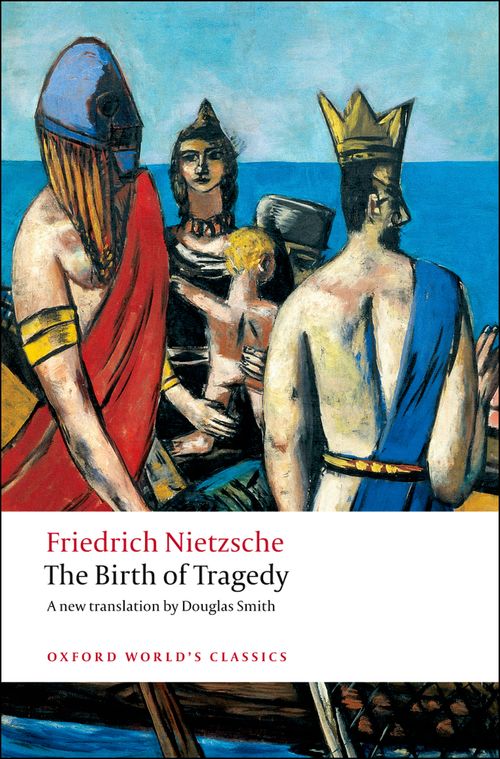Home >
Oxford World's Classics >
The Birth of Tragedy (Philosophy, Politics, History, Science, and Economics)
Oxford World's Classics: Philosophy, Politics, History, Science, and Economics | Philosophy, Politics, History, Science, and Economics
The Birth of Tragedy
ISBN: 9780199540143
Series: Oxford World's Classics: 哲学・政治・歴史・科学・経済
The Birth of Tragedy (Philosophy, Politics, History, Science, and Economics)
Oxford World's Classics: 哲学・政治・歴史・科学・経済 The Birth of Tragedy (Philosophy, Politics, History, Science, and Economics) メディア > 書籍 > ノンフィクション > 言語学習書 Expect Delays of Up to 4 Weeks| ご注文はこちら |
ISBN
9780199540143 (旧規格ISBN: 0199540144)
- 説明
- シリーズの説明
作家名:ニーチェ
放題:悲劇の誕生
'Yes, what is Dionysian? - This book provides an answer - "a man who knows" speaks in it, the initiate and disciple of his god.' The Birth of Tragedy (1872) is a book about the origins of Greek tragedy and its relevance to the German culture of its time. For Nietzsche, Greek tragedy is the expression of a culture which has achieved a delicate but powerful balance between Dionysian insight into the chaos and suffering which underlies all existence and the discipline and clarity of rational Apollonian form. In order to promote a return to these values, Nietzsche undertakes a critique of the complacent rationalism of late nineteenth-century German culture and makes an impassioned plea for the regenerative potential of the music of Wagner. In its wide-ranging discussion of the nature of art, science and religion, Nietzsche's argument raises important questions about the problematic nature of cultural origins which are still of concern today.
放題:悲劇の誕生
'Yes, what is Dionysian? - This book provides an answer - "a man who knows" speaks in it, the initiate and disciple of his god.' The Birth of Tragedy (1872) is a book about the origins of Greek tragedy and its relevance to the German culture of its time. For Nietzsche, Greek tragedy is the expression of a culture which has achieved a delicate but powerful balance between Dionysian insight into the chaos and suffering which underlies all existence and the discipline and clarity of rational Apollonian form. In order to promote a return to these values, Nietzsche undertakes a critique of the complacent rationalism of late nineteenth-century German culture and makes an impassioned plea for the regenerative potential of the music of Wagner. In its wide-ranging discussion of the nature of art, science and religion, Nietzsche's argument raises important questions about the problematic nature of cultural origins which are still of concern today.
Oxford World’s Classics は、誰もが知る有名な物語から一般読者にはなじみの薄い隠れた名作まで、古典や文芸作品の数々を100年以上に渡り提供し続けているオックスフォード大学出版局を代表する叢書です。 現在メソポタミア神話から20世紀小説の名著まで、約770タイトルを刊行しており、各作品に相応しい専門家を校訂者に迎え、原典に解題、注釈、年代記、関係書目を付して紹介しています。必要に応じ、地図や用語集、索引、図版等の付録をつけているほか、読者に最新の研究動向を踏まえた作品理解を促すべく、定期的な新刊の追加や、既刊タイトルの改版を行っています。
(注意:本書は、原文を掲載した書籍です。グレイデッド・リーダーではありません)
作家名:ニーチェ
放題:悲劇の誕生
'Yes, what is Dionysian? - This book provides an answer - "a man who knows" speaks in it, the initiate and disciple of his god.' The Birth of Tragedy (1872) is a book about the origins of Greek tragedy and its relevance to the German culture of its time. For Nietzsche, Greek tragedy is the expression of a culture which has achieved a delicate but powerful balance between Dionysian insight into the chaos and suffering which underlies all existence and the discipline and clarity of rational Apollonian form. In order to promote a return to these values, Nietzsche undertakes a critique of the complacent rationalism of late nineteenth-century German culture and makes an impassioned plea for the regenerative potential of the music of Wagner. In its wide-ranging discussion of the nature of art, science and religion, Nietzsche's argument raises important questions about the problematic nature of cultural origins which are still of concern today.
放題:悲劇の誕生
'Yes, what is Dionysian? - This book provides an answer - "a man who knows" speaks in it, the initiate and disciple of his god.' The Birth of Tragedy (1872) is a book about the origins of Greek tragedy and its relevance to the German culture of its time. For Nietzsche, Greek tragedy is the expression of a culture which has achieved a delicate but powerful balance between Dionysian insight into the chaos and suffering which underlies all existence and the discipline and clarity of rational Apollonian form. In order to promote a return to these values, Nietzsche undertakes a critique of the complacent rationalism of late nineteenth-century German culture and makes an impassioned plea for the regenerative potential of the music of Wagner. In its wide-ranging discussion of the nature of art, science and religion, Nietzsche's argument raises important questions about the problematic nature of cultural origins which are still of concern today.
シリーズの説明
Oxford World’s Classics は、誰もが知る有名な物語から一般読者にはなじみの薄い隠れた名作まで、古典や文芸作品の数々を100年以上に渡り提供し続けているオックスフォード大学出版局を代表する叢書です。 現在メソポタミア神話から20世紀小説の名著まで、約770タイトルを刊行しており、各作品に相応しい専門家を校訂者に迎え、原典に解題、注釈、年代記、関係書目を付して紹介しています。必要に応じ、地図や用語集、索引、図版等の付録をつけているほか、読者に最新の研究動向を踏まえた作品理解を促すべく、定期的な新刊の追加や、既刊タイトルの改版を行っています。
(注意:本書は、原文を掲載した書籍です。グレイデッド・リーダーではありません)
EASY ORDER FORM
表示価格が税込価格
価格(税抜):
1,960 円


